Related Research Articles

A data set is a collection of data. In the case of tabular data, a data set corresponds to one or more database tables, where every column of a table represents a particular variable, and each row corresponds to a given record of the data set in question. The data set lists values for each of the variables, such as for example height and weight of an object, for each member of the data set. Data sets can also consist of a collection of documents or files.

Interoperability is a characteristic of a product or system to work with other products or systems. While the term was initially defined for information technology or systems engineering services to allow for information exchange, a broader definition takes into account social, political, and organizational factors that impact system-to-system performance.

The University of Virginia (UVA) is a public research university in Charlottesville, Virginia, United States. It was founded in 1819 by Thomas Jefferson and contains his Academical Village, a UNESCO World Heritage Site. The original governing Board of Visitors included three U.S. presidents: Jefferson, James Madison, and James Monroe, the latter as sitting president of the United States at the time of its foundation. As its first two rectors, Presidents Jefferson and Madison played key roles in the university's foundation, with Jefferson designing both the original courses of study and the university's architecture. Located within its historic 1,135-acre central campus, the university is composed of eight undergraduate and three professional schools: the School of Law, the Darden School of Business, and the School of Medicine.

Charlottesville, colloquially known as C'ville, is an independent city in Virginia, United States. It is the seat of government of Albemarle County, which surrounds the city, though the two are separate legal entities. It is named after Queen Charlotte. At the 2020 census, the city's population was 46,553. The Bureau of Economic Analysis combines the City of Charlottesville with Albemarle County for statistical purposes, bringing its population to approximately 160,000. Charlottesville is the heart of the Charlottesville metropolitan area, which includes Albemarle, Fluvanna, Greene, and Nelson counties.

The College of William & Mary is a public research university in Williamsburg, Virginia, United States. Founded in 1693 under a royal charter issued by King William III and Queen Mary II, it is the second-oldest institution of higher education in the United States and the ninth-oldest in the English-speaking world. It is classified among "R2: Doctoral Universities – High Research Activity". In his 1985 book Public Ivies: A Guide to America's Best Public Undergraduate Colleges and Universities, Richard Moll included William & Mary as one of the original eight "Public Ivies". The university is among the original nine colonial colleges.
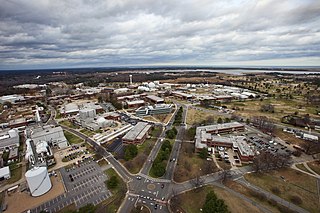
The Langley Research Center, located in Hampton, Virginia near the Chesapeake Bay front of Langley Air Force Base, is the oldest of NASA's field centers. LaRC has focused primarily on aeronautical research but has also tested space hardware such as the Apollo Lunar Module. In addition, many of the earliest high-profile space missions were planned and designed on-site. Langley was also considered a potential site for NASA's Manned Spacecraft Center prior to the eventual selection of Houston, Texas.

The United States Board on Geographic Names (BGN) is a federal body operating under the United States secretary of the Interior. The purpose of the board is to establish and maintain uniform usage of geographic names throughout the federal government of the United States.
Ecoinformatics, or ecological informatics, is the science of information in ecology and environmental science. It integrates environmental and information sciences to define entities and natural processes with language common to both humans and computers. However, this is a rapidly developing area in ecology and there are alternative perspectives on what constitutes ecoinformatics.
The CFA Institute is a global, not-for-profit professional organization that provides investment professionals with finance education. The institute aims to promote standards in ethics, education, and professional excellence in the global investment services industry. Since 1945, the institute has published the peer-reviewed, quarterly journal, the Financial Analysts Journal. It also publishes the Enterprising Investor blog.

The Rivanna River is a 42.1-mile-long (67.8 km) tributary of the James River in central Virginia in the United States. The Rivanna's tributaries originate in the Blue Ridge Mountains; via the James River, it is part of the watershed of Chesapeake Bay.
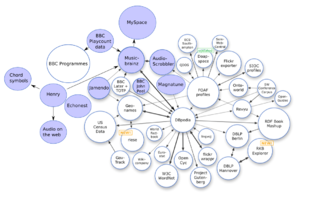
Open data are data that are openly accessible, exploitable, editable and shareable by anyone for any purpose. Open data are generally licensed under an open license.
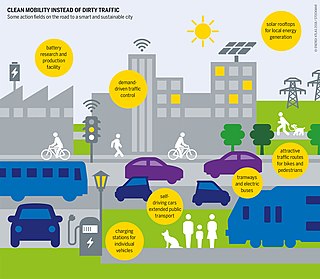
A smart city is an urban area that uses digital technology to collect data and to operate/provide services. Data can be collected from citizens, devices, buildings, or cameras. Applications include traffic and transportation systems, power plants, utilities, urban forestry, water supply networks, waste disposal, criminal investigations, information systems, schools, libraries, hospitals, and other community services. The foundation of a smart city is built on the integration of people, technology, and processes, which connect and interact across sectors such as healthcare, transportation, education, and infrastructure, etc. Smart cities are characterized by the ways in which their local governments monitor, analyze, plan, and govern the city. In a smart city, the sharing of data extends to businesses, citizens and other third parties who can derive benefit from using that data. The three largest sources of spending associated with smart cities as of 2022 were visual surveillance, public transit, and outdoor lighting.
Toronto Open Data is an open data initiative by the City of Toronto government in Toronto, Ontario, Canada. It provides a "world-wide, royalty-free, non-exclusive licence to use, modify, and distribute the datasets in all current and future media and formats for any lawful purpose" with proper credit. Four principles are "transparency, participation, accountability, and accessibility."
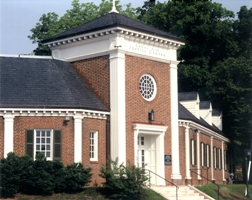
The Legal Aid Justice Center is a Virginia based non-profit organization which provides legal services and advocacy to low income individuals. It was founded in 1967 when its Charlottesville office was opened. It has three other offices, in Falls Church, Petersburg, and Richmond.
Sidewalk Labs LLC was an urban planning and infrastructure subsidiary of Google. Its stated goal was to improve urban infrastructure through technological solutions, and tackle issues such as cost of living, efficient transportation and energy usage. The company was headed by Daniel L. Doctoroff, former Deputy Mayor of New York City for economic development and former chief executive of Bloomberg L.P. until 2021. Other notable employees include Craig Nevill-Manning, co-founder of Google's New York office and inventor of Froogle, and Rohit Aggarwala, who served as chief policy officer of the company and is now Commissioner of New York City Department of Environmental Protection. It was originally part of Alphabet Inc., Google's parent company, before being absorbed into Google in 2022 following Doctoroff's departure from the company.

A Concert for Charlottesville was a benefit concert held on September 24, 2017, organized by the Dave Matthews Band to raise funds for the victims killed and injured during the Unite the Right rally held from August 11–12, 2017. The band labeled the event as "An Evening of Music and Unity."
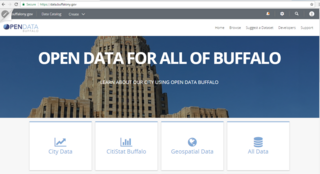
Open Data Buffalo is the open data program developed under the administration of Mayor Byron W. Brown in Buffalo, New York. The initiative is a commitment to proactively release high-quality, updated "publishable City data" through a centralized portal in machine-readable formats, fully accessible and freely available in the public domain. Open Data Buffalo is an official City program designed to foster transparency, innovation, accountability, and efficiency.

The Charlottesville car attack was a white supremacist terrorist attack perpetrated on August 12, 2017, when James Alex Fields Jr. deliberately drove his car into a crowd of people peacefully protesting the Unite the Right rally in Charlottesville, Virginia, killing one person and injuring 35. Fields, 20, had previously espoused neo-Nazi and white supremacist beliefs, and drove from Ohio to attend the rally.
Sidewalk Toronto was a cancelled urban development project proposed by Sidewalk Labs at Quayside, a waterfront area in Toronto, Ontario, Canada. The project was first initiated by Waterfront Toronto in 2017 by issuing the request for proposal (RFP) for development on the Quayside area. Sidewalk Labs, a subsidiary of Google, issued the winning bid in 2017. The Master Innovation Development Plan (MIDP) was created in 2019 through conversations with over 21,000 Toronto residents and had aimed to be an innovative reinvention of Toronto's neglected eastern downtown waterfront.
The data divide is the unequal relationship between those capable of collecting, storing, mining, and general management of immense volumes of data, and those whose data is collected. Using the framework of the digital divide, the data divide posits that the evolving nature of data and big data has created divisions and inequalities in data ownership, access, analysis, collection, and the manipulation of personal data generated by information and communications technologies (ICTs).
References
- 1 2 3 4 5 Mandell, Josh (27 August 2017). "City's open data portal goes online with hopes of creative use by public". Charlottesville Tomorrow.
- 1 2 Quaintance, Zack (1 September 2017). "Charlottesville, Va., Launches Its First Open Data Portal". GovTech .
- ↑ "Open Data in the City of Charlottesville". RealCentralVA.com. 9 November 2017.
- 1 2 3 Caldwell, Doug (11 February 2020). "Cville Releases Master Address Point Dataset". Smart Cville.
- 1 2 3 Beane, Lucas; Gillis, Elena; Alvarado, Rafael; Wylie, Caitlin (April 2019). "Developing a data pipeline to improve accessibility and utilization of Charlottesville's Open Data Portal". 2019 Systems and Information Engineering Design Symposium (SIEDS). pp. 1–5. doi:10.1109/SIEDS.2019.8735653. ISBN 978-1-7281-0998-5. S2CID 189825184.